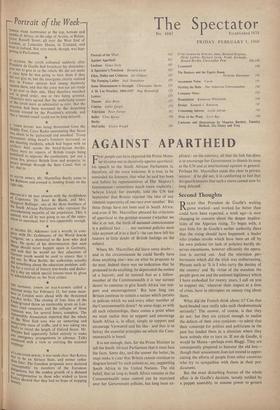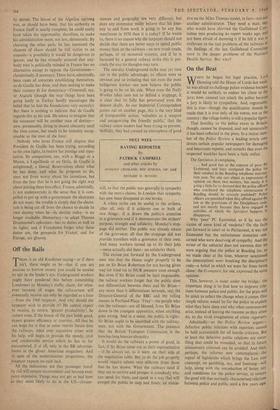Second Thoughts
RD ELIEF that President de Gaulle's waiting game worked—and worked far better than could have been expected, a week ago—is now changing to concern about the deeper implica- tions of the Algerian rising. To begin with, it says little for de Gaulle's earlier authority there that the rising should have happened; a leader who crushes revolts which have been set off by his own policies (or lack of policies) hardly de- serves encomiums, however efficiently the opera- tion is carried out. And the television per- formance which did the trick was embarrassing. Phrases such as 'It is 1 who carry the destiny of the country' and 'By virtue of the mandate the people gave me and the national legitimacy which
I have embodied for twenty years, I call on you to support lite,' whatever their impact at a time of crisis, have in retrospect an uneasy ring about them.
What did the French think about it? Can that hard-headed race really take such rhodomontade seriously? The answer, of course, is that they do not; but they are cynical enough to realise the defects of their own cynicism—to admit that their contempt for politics and politicians in the past has landed them in a situation where they have nobody else to turn to. If not de Gaulle, it would be Massu—perhaps even Biaggi. They are consequently prepared to humour the old boy— though their amusement does not extend to appre- ciating the efforts of people from other countries who try to sympathise with them in their pre- dicament.
But the most disturbing feature of the whole affair is de Gaulle's decision, tamely ratified by a puppet assembly, to assume power to govern
by decree. The lesson of the Algerian uprising was, or should have been, that his authority in France itself is nearly complete; he could easily have taken the opportunity, therefore, to make his administration more, not less, democratic. By choosing the other path, he has increased the chances of chaos should he fall victim to an assassin—a possibility it would be dangerous to ignore; and he has virtually ensured that any- body who is politically minded in France has no alternative except to oppose the Government— clandestinely, if necessary. There have, admittedly, been cases of autocrats establishing themselves, as de Gaulle has done, and then seeking to make their country fit for democracy—Cromwell, say, or Ataturk (though the way things have been going lately in Turkey hardly encourages the belief that he laid the foundations very securely). But there is nothing to indicate that de Gaulle regards this as his task. He seems to imagine that his successor will be another man of destiny— now, presumably, living in decent obscurity until the time comes, but ready to be instantly recog- nisable as the man of the hour.
Nobody who loves France will dispute that President de Gaulle has been trying, according to his own lights, to restore her prestige and repu- tation. By comparison, too, with a Biaggi or a Massu, a Lagaillarde or an Ortiz, de Gaulle is enlightened; a liberal. Reservations about what he has done, and what he proposes to do, stem not from worry about his intentions, but from the fear that he is not going the right way about putting them into effect. France, admittedly, is not undemocratic in the sense that it is com- pelled to put up with a government the electorate do not want; the trouble is simply that the electo- rate is being cut off from the chance to decide its own destiny when he—its destiny today—is no longer available. Democracy—to adapt Thomas Drummond's aphorism--has its duties as well as its rights; and if Frenchmen forget what those duties are, the prospects for France, and for Europe, are gloomy.











































 Previous page
Previous page